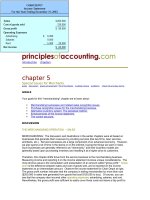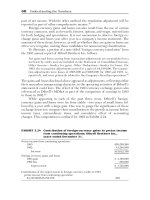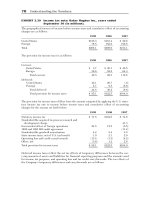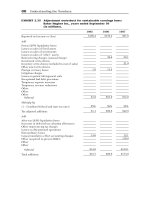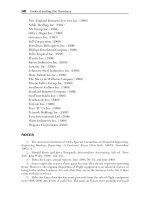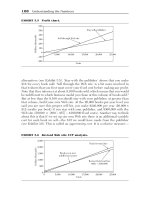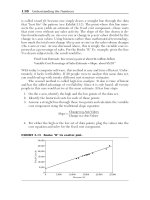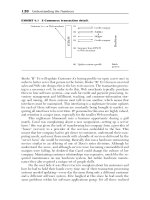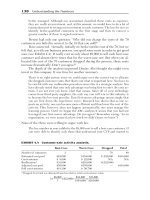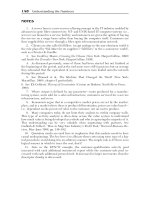Tiếng anh chuyên ngành (ac10)
Bạn đang xem bản rút gọn của tài liệu. Xem và tải ngay bản đầy đủ của tài liệu tại đây (75.41 KB, 11 trang )
ANH VĂN CHUYÊN NGÀNH 1 – AC10
............. accounts are individual accounts of debtors and
creditors.
............. accounts cover asset accounts such as premises,
motor vehicles, etc.
............. accounts cover various income and expense accouris,
e.g. sales, wages, etc.
.................. account is used for regular banking and
withdrawal of money.
........... is a general term for activities of the business.
............ is an amount received from creditors when paying
them within required time.
............ is a direct means of transferring money through the
bank systems, which is initiated by the paying party.
................. is indicated in the invoice and recorded in the
accounts.
.............. is used to record Cash & Bank accounts
.............. is direct transfer between bank accounts, involving
fixed accounts at regular intervals.
.............. Ledger is used to record debtor accounts
.............. Ledger is used to record creditor accounts
........ means a charge paid by the firm to carrier for delivering
personal
real
nominal
current
transactions
discount received
credit transfer
Cash discount
Cash book
standing order
Sales
Purchases
carriage outwards
goods to customers: Cost of distribution
‘Balance sheet’ is .........
‘Capital’ is ................
a type of financial statement
the amount of the owner’s stake in the business.
4 types of personal accounts include capital, supplier,
customer, and..........
drawings
A
A .... is someone who owes you money after you sell him/ her
on credit.
A ....... is someone to whom you owe money after you buy on
credit.
A general term for amounts owing to persons other than the
owner is......
According to double-entry rules, if a liability decreases, .......
According to double-entry rules, if an asset increases, .......
debtor
Creditor
liabilities
Liability account will be debited
asset account will be debited
B
Book-keeping entries relating to Credit Purchase are:
Book-keeping entries relating to Payment received from
debtor are:
Book-keeping entries relating to Sales Returns are:
Book-keeping entries relating to Payment to creditor are:
debit purchases account & credit supplier’s
(creditor’s) account
debit bank/ cash account & credit debtor’s account
debit Returns Inwards account & credit debtor’s
account
debit creditors account & credit bank/ cash account
Book-keeping entries relating to Credit Sales are:
debit customer’s (debtor’s) account & credit sales
account
debit Cash/ Bank account & credit Sales account
debit purchases account & credit Cash/ Bank
account
credit Returns Outwards account & debit supplier’s
(creditor’s) account
Book-keeping entries relating to Cash Sales are:
Book-keeping entries relating to Cash Purchases are:
Book-keeping entries relating to Purchases Returns are:
C
Calculate Current Liabilities from the following details: Fixed
assets: £53,000; Current assets: £28,500; Capital: £ 66,500;
Long-term liabilities: £8,300.
Calculate Gross Profit from the following details: Cost of
goods sold: £15,200; Sales £23,700, Returns Inwards £1,420.
Calculate Net Profit from the following details: Gross profit:
£12,000; Rent payable: £1,500; Rent receivable: £420; Wages:
£ 1,210; Insurance: £300; office expenses: £420; travelling
expenses: £270.
Calculate Net Profit from the following details: Gross profit
£12,400; Expenses £7,550, Commission £420.
Calculate Net profit from the following details: Total of
Capital at the end of period: £62,000; capital at the beginning
of period: £48,000; Drawings: £2,420
Calculate the Fixed Assets from the following details: Total of
£6,700
£7,080
£8,720
£5,270
£16,420
£44,060
assets: £73.600; Stock £2,200, Debtors: £2,800, Cash: £ 3,240,
Bank: £21,300
Calculate the total of Assets from the following details: Fixed
assets: Furniture and fittings: £12,000; Motor vehicle: £ 7,000
- Current assets: Stock £2,200, Debtors: £1,850, Cash: £
3.410, Bank: £13,000
£39,460
F
From Sales Day book, detail is transferred promptly to ..........
account in Sales Ledger
From Sales Day book, detail is transferred monthly to Sales
account in ...........
From the transaction below: ‘A Smith owed the business
£1,800 for the goods sold to him & he paid his debt within
required time; hence 3% cash discount was given to him’.
What kind of discount is it?
From the transaction below: ‘A Smith owed the business
£1,800 for the goods sold to him & he paid his debt within
required time; hence 3% cash discount was given to him’.
How much cash discount was given to him?
From the transaction below: “A Smith owed the business
£1,800 for the goods sold to him & he paid his debt within
required time; hence 3% cash discount was given to him.
Debtor’s
General Ledger
discount allowed
£54
£1,746
How much did A Smith actually pay?
From the transaction below: ‘A Smith owed the business
£1,500 for the goods sold to him on May 10, Year 2. The
terms of sale allow for 3% cash discount for payment within 7
days. On May 15, Year 2, A Smith paid his debt by cheque.’
What entries in the cash book are necessary for this
transaction?
From the transaction below: ‘Credit sale to P Starkey at list
price of £360, subject to 15% trade discount’. How much
discount will be given to P Starkey?
From the transaction below: ‘Credit sale to P Starkey at list
price of £360, subject to 15% trade discount’. How much will
be recorded into accounts?
From the transaction below: ‘You owed A John, a creditor
£2,000 for the goods bought from him & You paid your debt
within required time; hence 3% cash discount was received’.
How much did you have to pay?
From the transaction below: ‘You owed A John, a creditor
£2,000 for the goods bought from him & you paid your debt
within required time; hence 3% cash discount was received’.
How much cash discount did you received?
From the transaction: ‘S Smart –a debtor returned goods to the
business’. In what accounts & what ledger will it be recorded?
From the transaction below: ‘The business owed L Turner
Dr Discount allowed £45 & Dr Bank £1,455
£54
£306
£1,940
£60
Dr Returns Inwards a/c in General Ledger & Cr S
Smart a/c in Sales Ledger
Cr Discount received £100 & Cr Bank £1,900
£2,000 for the goods bought from May 20th Year 2. By
paying by cheque within a specified time (May 23, Year 2),
the business can receive a cash discount of 5%’.
What entries in the cash book are necessary for this
transaction?
From the transaction: ‘Credit purchase from S Letts at list
price of £250, subject to 10% trade discount; then return
goods to S Letts at list price £40’. How much will the business
finally owe S Letts?
From the transaction: ‘Credit purchase from S Letts at list
price of £250, subject to 10% trade discount; then return
goods to S Letts at list price £40’. How much will the business
record in Return Outwards account?
From the transaction: ‘Credit purchase from S Letts at list
price of £250, subject to 10% trade discount’. In what Day
book and what accounts will it be recorded & How much will
it be recorded?
From the transaction: ‘K Devine returns to us goods with a list
price of £150. No discount Was previously made.’ In what
accounts will it be recorded?
From the transaction: ‘Return goods to S Letts at list price
£40’. In what Day book and what accounts will it be
£189
£36
Purchases Day book; Dr Purchases £225 ; Cr S Letts
£225
Dr Returns Inwards £150 & Cr K Devine £150
Returns Outwards Day book; Dr S Letts a/c & Cr
Returns Outwards a/c
recorded?
From the transaction: ‘Credit purchase from A John at list
price of £880, subject to 20% trade discount’. How much will
the business record into Day book?
From the transaction: ‘Credit purchase from A John at list
price of £880, subject to 20% trade discount’. How much
discount will the business receive?
£704
£176
H
How is ‘Carriage inwards’ treated in final accounts?
Carriage inwards is deducted in the amount of
Purchases
Carriage inwards is added into expense column
Carriage outwards is added into expense column
How is ‘Carriage Outwards’ treated in final accounts?
How is ‘Carriage Outwards’ treated in final accounts?
I
In the accounting equation, ........
In the following transaction: ‘The owner puts a further amount
into the business by cheque’, which account is debited and
which account is credited?
In the transaction below: ‘You owed A John, a creditor for the
goods bought from him & you paid your debt within required
time; hence A John gave you cash discount’.
What kind of discount is it?
In the transaction ‘wages of £40 are paid in cash’, which
The two sides will always be equal to one another
debit bank account & credit capital account
discount received
Dr wages account £40 & Cr Cash account £40
entries are correct?
In the transaction, ‘Goods sold for £210 on credit to T Smith’,
which entries are correct?
In the transaction: ‘Paid £442 in cash to A Dobbs in settlement
of a debt of £450’. What entries in the Cash book are done?
In the transaction: ‘Cash sale £1,410, in which £410 was
received in cash’. What entries in the Cash book are done?
In the transaction: ‘Received a cheque of £1,200 from A
Smart in full settlement of debt of £1,212’. What entries in the
Cash book are done?
In the transaction: ‘Withdrew £420 from bank to make cash in
office’. What entries in the Cash book are done?Nếu vụ án
khơng thuộc thẩm quyền của mình thì Tịa án phải trả hồ sơ
cho Viện kiểm sát.
The account ‘Bank’ has 3 transactions during July, Year 4,
including 1 debit entries with £2,000 and 2 credit entries with
£170 and £240. How much is the balance of this account at the
end of July, Year 4?
The account ‘Bank’ has 3 transactions during July, Year 4,
including 1 debit entries with £5,000 and 2 credit entries with
£ 170 and £240. How much is the balance of this account at
the end of July, Year 4?
The account ‘T Dove’ has 4 transactions during May, Year 4,
including 2 debit entries with £150 & £80 and 2 credit entries
Dr T Smith £210 & Cr Sales £210
Cr Discount received £8 & Cr Cash £442
Dr Cash £410 & Dr Bank £1,000
Dr Discount allowed £12 & Dr Bank £1,200
Cr Bank £420 & Dr Cash £420
£1,590 Dr
£1,590 Dr
£25 Dr
with £170 and £35. How much is the balance of this account
at the end of May, Year 4?
The account ‘T Smith’ has 4 transactions during July, Year 4,
including 2 debit entries with £50 & £80 and 2 credit entries
with £170 and £230. How much is the balance of this account
at the end of July, Year 4?
The capital equation is:
The difference between current account and deposit account is
that current account is used for ............ banking and
withdrawal of money, and in deposit account withdrawals will
be.............
The following detail appears in the Purchases Day Book:
‘T Smith56/637£656’
To what accounts & Ledgers will this detail be transferred?
The formula for Cost of goods sold is:
The invoice gives details of .................
The main difference between ‘Expenses’ and ‘Drawings’ is
that.......
The term ‘account’ means......
The total of discount received column in the cash book will be
transferred to ............. Ledger.
£270 Cr
Assets less liabilities equals capital
regular/ infrequent
T Smith a/c in Purchases Ledger; Purchases a/c in
General Ledger
Opening
stock+Purchases+Carriage
inwardsReturns outwards-Closing stock
Both Trade discount and Cash discount
‘Expenses’ is the costs of running a business and
‘Drawings’ is withdrawals from a business by the
owner for his private use
a record of transactions by category (purchases, for
example), or by person or organization.
General
The term ‘Transaction on credit’ means ........
The term ‘Drawings’ means
The word......... in the heading of the balance sheet is linked to
the idea of the snapshot photograph.
T-type Ledger accounts has the following format:
taking an ownership of an asset now, but paying for
it at later stage
withdrawals from a business by the owner for the
owner’s private use: in cash or goods/ services
at
two-sided account with debit side on the left and
credit side on the right
W
Where balances are carried forward from one page to the next,
‘balance .........’ would appear at the bottom of one page and
‘balance .......’ at the top of the next page.
When you received money from debtors who pay their debts
within required time, the discount you give him is
called .............
Which account below is close off to Profit and Loss account?
Which account below is close off to Trading account?
Which item below is not an asset?
Which item below is not an expense?
c/f – b/f
discount allowed
Carriage Outwards
Carriage Inwards
Creditor
Rent receivable
Y
You are presented with the following data:
Assets 13,970
the two sides are not equal. One figure must be
incorrect
Capital 2,934
Liabilities 11,576
What comment would you make?
You can calculate............ profit in ‘Profit and Loss accounf’.
You can calculate............ profit in ‘Trading accounf’.
Net
Gross
